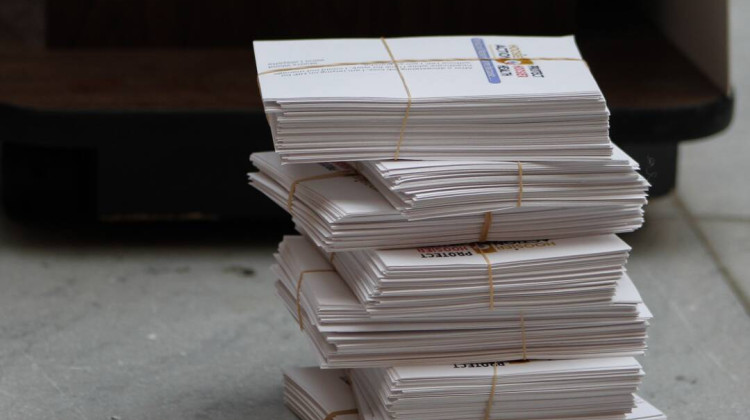BLOOMINGTON -- Medical device manufacturers across the country are getting some temporary relief after lawmakers passed a two-year suspension of the medical device tax at the end of last year.
The life sciences industry has been trying to repeal the tax since it took effect in January 2013, including several Indiana companies. The 2.3 percent levy helps offset the costs of the Affordable Care Act, but opponents argue it’s a job killer and prohibits growth of the industry.
Many Indiana companies are hopeful the suspension will eventually turn into a full repeal of the tax.
Tax Halted Expansion For Bloomington-based Cook
The warehouse at Cook Medical’s Bloomington headquarters is bustling with energy.
A pressurized conveyor belt pushes dozens of white and red packages down the line, where workers throw in plastic packaging before sending them off to be shipped around the world.
Cook employs about 5,000 people in Indiana and the company would like to expand its operations. But company officials decided to put some of those plans on hold when the medical device tax went into effect three years ago.
“When the tax was first adopted by Congress, Cook had on its design table five manufacturing plants that they were hoping to building in the United States,” says Vice President of Public Policy Gretchen Gutman. “And the minute that tax was adopted, those expansion plans were put on hold.”
The medical device tax helps offset the costs of the Affordable Care Act. The argument is since medical device manufacturers could benefit from expanded healthcare coverage nationwide, they should help foot some of the bill.
The Congressional Research Service estimates the levy could generate $29 billion in net revenues over the next decade.
But medical device manufacturers like Cook say that’s coming at a significant cost to them.
“A lot of people say it was just 2.3 percent, but the real impact at Cook was it raised our tax liability 32 percent,” Gutman says.
Indiana Legislators Pushing For Full Repeal Of Tax
The medical device tax is an excise tax, which means it’s an off the top tax that isn’t paid for directly by consumers.
That translates to a significant impact on the finances of Indiana manufacturers — whether they’re making money or not.
“For companies that are doing well, some calculations I’ve seen on the back of an envelope it’s probably equivalent to a 10 or 15 percent increase in income tax,” says George Telthorst, Director of the Center for Business Life Sciences at Indiana University’s Kelley School of Business.
For the next two years companies won’t have to shoulder that burden.
Lawmakers passed a suspension of the tax with their spending budget in December.
“It never should have been put there in the first place,” says Sen. Dan Coats, R-Ind. “It is a tax unlike any other tax. If you don’t make a profit — if you don’t earn an income — then you don’t pay tax. But this one imposed taxes whether you had a profit or not, simply on your sales. And a lot of these new companies that were coming on simply in the development stage weren’t making a profit and yet had to forfeit over big money to the IRS.”
The Life Sciences industry is huge in Indiana — accounting for roughly one-third of the state’s exports. Because of the industry’s impact, both of Indiana’s senators support a full repeal of the medical device tax. But multiple efforts to kill the tax have failed.
They’re hopeful that could change next year.
“Seventy nine senators voted on a budget bill a couple years ago stating their position on full repeal,” Coats says. “That was a very substantial amount of Democrats on their side and all the Republicans. Seventy nine out of 100 is a pretty good indicator that there will be real support for going forward under a new president.”
Until then, companies like Cook say the temporary relief will allow them to address short-term needs like hiring.
But once the suspension expires, they’ll be faced with more tough decisions.
“We can’t pay for a tax that has that kind of impact by reducing the number of pencils or paper clips that you buy,” Gutman says. “It really means you’re not going to expand your company, you’re not going to do R&D research. It really has an impact on allowing a company to innovate.”
 DONATE
DONATE








 Support WFYI. We can't do it without you.
Support WFYI. We can't do it without you.